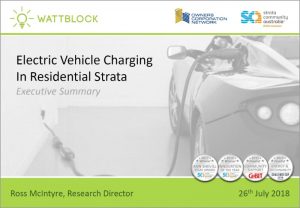News
Electric Vehicle Charging in Strata Report
August 22, 2018
Under the Sustainable Sydney 2030 strategic plan the City of Sydney provided innovation grant funding to study Electric Vehicle (EV) charging in residential apartment buildings. The final report was approved on 26th July 2018. The study was conducted by Wattblock with in-kind contributions from Evercharge, AGL and Tesla. You can download a copy of the report here.
Lord Mayor Clover Moore said the City of Sydney is proud to support Wattblock prepare for a future where more people living in apartments will need to charge their electric vehicles.
“Wattblock’s research is a great example of the type of projects our environmental grants program is designed to support. Their insights will guide conversations about the infrastructure required in order to cope with more electric vehicles in our city.”

The project examined current Electric Vehicle (EV) charging solutions for residential strata, different commercial models, strata by-laws, and government incentive programs to promote uptake. In addition, the final report covers research looking at how utility companies can play a role in avoiding localised power outages due to “EV clustering” and the impact of EV charging Demand Management (DM) solutions.
As part of the project 20 residential apartment buildings (3,317 apartments) were engaged to receive an electric vehicle assessment report for their building. Participant buildings were selected to cover a cross section of building size, demographics, and representation across different suburbs within the City of Sydney. Wattblock also ran a resident survey to gauge attitudes and intentions of residents toward electric vehicles and charging facilities. The survey has been extended with 131 strata schemes to date from the broader Sydney, Melbourne, Perth, Brisbane, Sunshine Coast and Gold Coast.
Wattblock project director and co-founder, Ross McIntyre said “Overwhelmingly 81% of survey respondents in the City of Sydney were in favour of installing electric vehicle charging facilities”. Findings from the project include:
48% of respondents plan to have an electric vehicle within the next 5 years
The majority want a user pays charging system (79%) on individual car spaces (61%)
Most buildings will require integration with the common area power supply (eg lifts, carpark, foyers, facilities)
Power management systems will be needed to shift EV charging loads overnight
Energy efficiency and renewable energy projects can increase capacity
By-laws are needed to manage electric vehicle charger installation and usage
For the 20 participant buildings investment to provide full access to EV charging has a 2.9 year payback
New developments are starting to market their buildings as “EV Ready” to attract premium values
The full Electric Vehicle Recharging in Residential Strata Buildings project report can be downloaded online. The project report includes a high level decision tree diagram and checklists that can be further used to assist strata in working through the issues. The report covers issues such as how to bill owners for charging, which location is the best, how to set it up, types of charging equipment, and risks around overloading the common area power supply. The report also provides some analysis around the location and impact of public charging stations as well as the carbon impact with the deployment of electric vehicles.
Wattblock is calling for further participants in their national resident survey. Running a survey is a logical starting point for understanding intentions and attitudes toward electric vehicles. Strata managers can contact Wattblock to register and set up the survey for their strata schemes. The broader results will be used to assist local councils in planning for electric vehicle charging.
For further reading you can download the report, executive presentation and media release online here.
This article was contributed by Ross McIntyre Chief Data Officer – Wattblock. Winner of SCA Innovation of the Year, Wattblock specialises in low cost energy assessments and energy management strategies for strata buildings.
*Note: The City’s Environmental Performance Innovation Grant program supports feasibility and demonstration projects that test or demonstrate new technologies and processes that are not currently implemented in the local market, but have the potential to achieve greenhouse gas emission reductions and resource efficiencies at scale within the City of Sydney Local Government Area. Grant funding supports the City’s work towards the environmental performance targets included in its community strategic plan Sustainable Sydney 2030.
